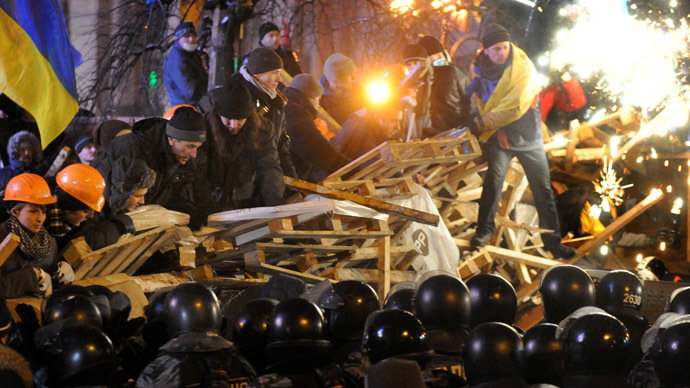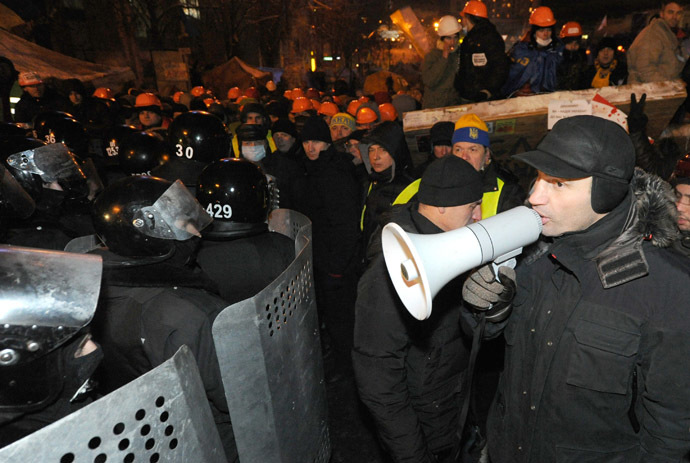'Ukraine shouldn’t be made to choose between Russia and Europe'

Ukraine should be able to have its cake and eat it too; it can have a partnership with Europeans and at the same time continue to have strong ties with Russia, political researcher Charles Kupchan told RT.
RT:EU foreign policy chief Catherine Ashton is now in Ukraine along with many other foreign lawmakers and diplomats. Is this the sort of visit we would see in another European country in crisis?
Charles Kupchan: I think Ukraine is looming large in the minds of diplomats from the US and Europe today for two different reasons. One is that there's a hope that violence can be avoided, and that, whatever the outcome of the stalemate between Yanukovich’s government and opposition, there isn't a decision to use security forces that ends up in bloodshed. And the second issue is that Ukraine is to some extent caught between turning toward Russia and turning toward the EU and churning its political and economic future. And I think the EU is somewhat upset that the accession discussions, the partnership that was emerging, seems to have been scuttled in favor of an alignment with Russia. And at this point there is leverage that is being deployed both by US and EU diplomats to see if they can push Kiev back in the direction of Europe.
RT:Why are we seeing US diplomats there, why is this situation of interest to Washington?
CK: I don't think that the problem stems from the presence of EU diplomats. I think the problem stems from a country that has historically been quite divided politically and culturally. A Western half that tends to be more grounded in Europe, it speaks Ukrainian, and an Eastern half that feels much closer to Russia historically, linguistically, and still watches Russian television. And in many respects that's reflected in a different electoral basis, with Yanukovich having his electoral strength in the East, the opposition in the West. Businessmen with ties to Russia are leaning toward Yanukovich, pushing him toward Moscow, business communities that are more tied to the West are leaning toward the EU, so this is really about a country that is working out the cleavages that stem from a very complicated past both culturally and politically.

RT:Isn't there a danger that this foreign presence could be provocative and divide the country even more?
CK: It's interesting that there have been protests in the East against Yanukovich, because that's supposed to be the part of the country that's aligning with him and seeking ties to Russia. Frankly, I think in this case Yanukovich has overplayed his hand, and in many respects Ukrainians are standing up and saying "We want a future with multiple options, we don't want to go backwards, we don't want to go in a world in which we have to choose between Russia and the West." To some extent Yanukovich has faced them with this choice, and now you have hundreds of thousands of people in the streets saying "No, we want to move forward to a new future, not looking back and trying to reconstitute alignments of the past."
RT:Do you think President Yanukovich has buckled under pressure, as he says he's ready to start new talks?
CK: Ukraine has always been an important country, geopolitically, economically. There has been a debate that's been going on since the end of the Cold War and collapse of the Soviet Union about in which way Ukraine will tilt. And I think the American position is that Ukraine should be able to make its own choices in its alignments politically, geopolitically and economically, and that right now what we are seeing is a country in the midst of a debate about where it wants to head. And the answer should be, it should be able to have its cake and eat it too; it shouldn't have to choose between Russia and Europe. It can have a partnership with Europeans as the US would like; it can continue to have strong ties with Russia; it shouldn't be put in a position to choose.
I would say there’s bewilderment in the US about the decisions the Russian leadership has made about finding itself as Eurasian, as opposed to working toward a greater engagement with Europe and the US. And Ukraine seems to be heading in the same direction. There is an obvious win-win scenario here, in which both Ukraine and Russia deepen their ties with the EU. If you look at Russia's and Ukraine's future, it is really Europe which affords good opportunities in terms of investment and commerce.
What the US and European diplomats are doing is called diplomacy. They are not breaking any laws, they are not trampling on anybody's sovereignty, they are going there to make a case for a Ukraine that builds a future moving forward, not one that is trying to reconstitute alliances of the past. They are simply doing their job.
The statements, views and opinions expressed in this column are solely those of the author and do not necessarily represent those of RT.
The statements, views and opinions expressed in this column are solely those of the author and do not necessarily represent those of RT.












